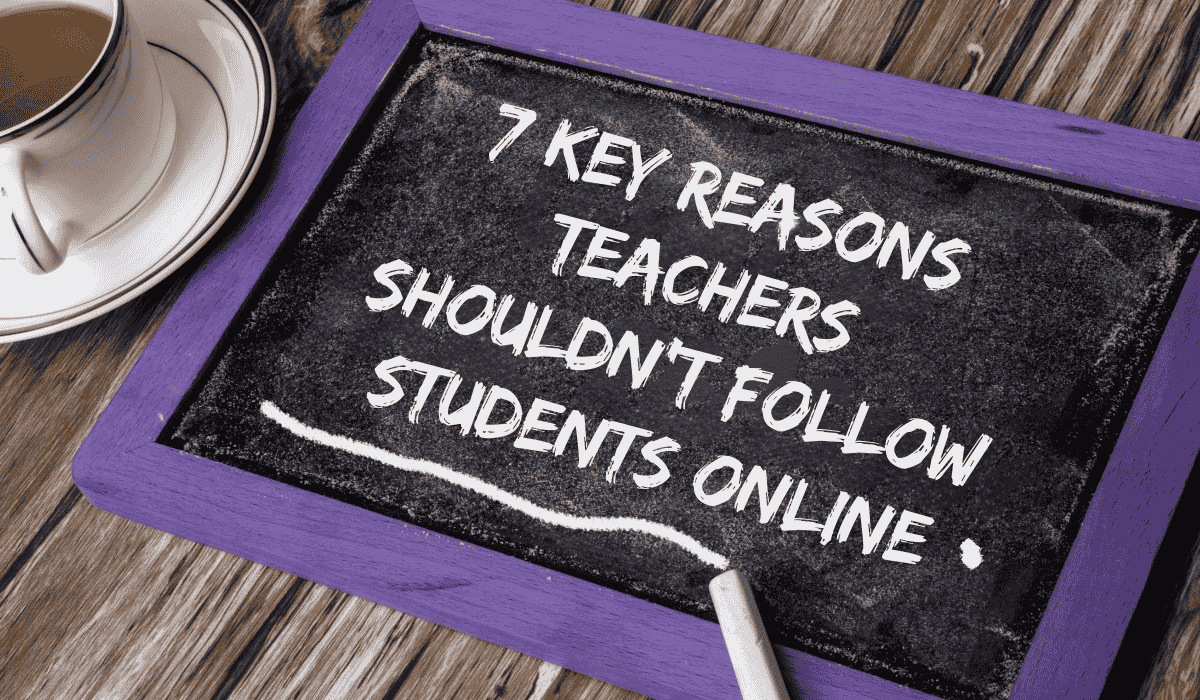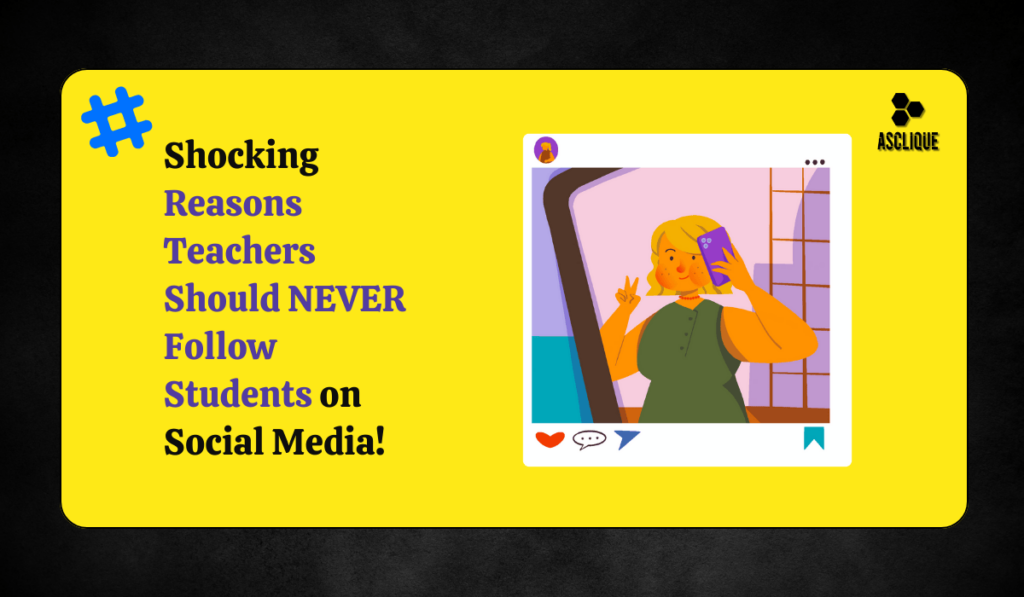Today, social media is an integral part of daily life among the younger generation. It offers a platform for students to interact with friends, share ideas, and express themselves. Conversely, with the rise of social media among teachers too who engage with their peers, parents, and students, the question is why teachers shouldn’t follow students on social media.
This article is going to explore the reasons why teachers should not follow students on social media, discussing the risks, ethical concerns, and implications it holds for the students and educators.

Professional Boundaries
One of the reasons teachers should avoid following students on social media is to maintain professional boundaries. A teacher-student relationship is founded on respect, authority, and trust. Social media, by its very nature, blurs the lines between personal and professional lives. If teachers follow their students on platforms like Facebook, Instagram, or Twitter, they risk crossing those boundaries.
With the advancement of social media, students today have the option to know how a teacher goes about in life, not necessarily his opinion regarding any matters. The relationships built between students and teachers when following each other, however, raise awkward issues for both, given that what should not have appeared in one’s view becomes the case with teachers. Thus, the level of relationship becomes somewhat affected or goes wrong sometimes, which causes serious damage in general.
Teachers’ social media profile should be private so that students do not access content that is likely to undermine their authority and professional role. This makes a learning environment safer, and the students will keep regarding their teachers as professionals.
- Teachers should maintain personal and professional lives detached from each other.
- Social media sets a blurred line between teacher authority and engagement.
- Avoiding social media interactions helps preserve professionalism in the classroom.
Student Privacy
Following students on social media also raises issues about student privacy. Many students share personal information online, but most of them do not know what the implications of such actions are. Some share information they feel is harmless, but in fact, it may be misinterpreted or lead to unintended consequences.
Teachers should respect the privacy of students by not accessing information that students do not want to share with their authority figures. Some students use social media to express their frustrations, opinions, or feelings about their personal lives. Such posts may include family issues, mental health struggles, or peer relationships, which they may not wish to be observed by their teachers.
Teachers who observe students may also be exposed to this private information, which would be uncomfortable for them or violate the privacy of the student. Students should have personal spaces on social media not related to interactions with authority figures.
- Students may secretly want to air their personal struggle through social media posts.
- Teachers should respect the privacy of students, both online and offline.
- Allow students to maintain their personal lives away from professional oversight.
Reducing the Risk of Miscommunication
Another significant reason teachers should not allow students to follow them on social media is the danger of miscommunication. Social media websites are used for informal communication whereby the intent and situation behind the comment get misinterpreted. A comment from a teacher might be misconstrued by a student, thus leading to confusion, conflict, or miscommunication.
For instance, a teacher may comment on a student’s post with the intention of complimenting or encouraging the student, but the student may misinterpret it as criticism. Such misunderstandings can be very damaging to the teacher-student relationship, creating confusion about the teacher’s intentions.
This can also be a means to express the opinion of students on various topics, not all of which coincide with the views of the teacher. A student might post something controversial or something thought to be inappropriate if perceived by the teacher that may give rise to awkward meetings or miscommunications. Teachers must not get involved in situations that might cause them discomfort as they must have a defined boundary between their professional roles and personal lives of the students.
- Social media communication can lead to misunderstanding intentions.
- Teachers should never comment on their students’ posts because it is likely to misinterpret.
- Maintaining formal communication avoids conflicts and confusion.
Protecting Against Cyberbullying
Cyberbullying is a significant issue that affects students today. Social media platforms, unfortunately, serve as breeding grounds for harmful behavior. While teachers should do everything they can to ensure students’ safety in school, their role doesn’t necessarily extend to monitoring students’ social media behavior.
Following students on social media makes teachers expose themselves in such a way that they find themselves receiving negative comments or being bullied by other students. Having information on content like these subjects teachers to a dilemma since they will have the urge to step in or confront the students in ways that are inappropriate in a virtual setting.
Teachers need to focus on providing a safe and supportive classroom environment but should avoid intruding into their students’ social media lives. Involvement in matters of the internet may lead to mistrust, and the students might feel uncomfortable when they realize that their personal lives are under surveillance by authority figures.
- Teachers should not interfere with students’ social media conflicts.
- Cyberbullying may be exacerbated by teachers’ involvement in social media.
- Teachers should maintain their role as educators, not online moderators.
Ensuring Equal Treatment for All Students
When teachers follow students on social media, it leads to favoritism or perceived bias. Teachers may unintentionally give more attention to certain students by liking their posts or engaging with their content more frequently than others. This behavior can lead to feelings of exclusion among students who are not followed or whose content is not interacted with as much.
In a classroom environment, every child should feel important and valued equally. Social media engagement in a classroom can actually harm the relationship between the teacher and the student, as favoritism develops, making children feel marginalized or less important. Teachers need to be conscious of how their behavior, both in and out of the classroom, affects their perception by students.
- Social media unwittingly creates the perception of favoritism.
- All students should be treated the same way both in virtual and real-life interactions.
- Teachers should not need to communicate with just a few students through social media.
Creating a Safe Online Environment for Teachers
Teachers, too, are victims of the same negative effects from social media involvement. Following their students on social media can get teachers unwanted attention, criticism, or even harassment. In the worst cases, teachers may face cyberbullying or inappropriate messages from students, parents, or other members in the community.
They can keep their social media personal accounts private and also not follow up any of the students. This helps in maintaining the privacy of the teaching profession and avoids unwanted interactions that would hamper professional lifestyles.
- Teachers have to safeguard themselves against online harassment and criticism.
- Privacy ensures teachers’ control over personal online presence.
- Teachers should utilize privacy settings to abstain from unwarranted exposure to negative online interactions.
Being a Healthy Example Through Social Media
Teachers are always in the direct line of molding behavior and attitudes of their students. If teachers refuse to follow students on social media, this behavior portrays them as examples of healthy social media use. The ways of showcasing such examples of proper boundaries in the online world also make students understand that they should keep some separation between their academic and their personal lives.
Teachers should encourage students to be responsible with what they share on social media and use the platforms responsibly. Teachers, by keeping a professional distance, reinforce the message that social media is for personal expression, not a space for professional interactions or academic matters.
- Teachers should model healthy and responsible social media habits.
- By not following students, teachers set clear personal boundaries.
- Students should be advised to restrict their social media to private and personal.
Conclusion
The digital world can be a force that will revolutionize education and will benefit the learning experience, but will lead educators into many challenges for them and the students as well. Though teachers need to be accessible and approachable, this practice of following students on social media will soon create complications to undermine the professional relationship between teachers and students.
These are just a few of the reasons why teachers should not follow students on social media: to maintain clear boundaries, protect privacy, and ensure equal treatment. Separating their personal and professional lives will allow teachers to preserve their authority, create a safe learning environment, and set a good example for their students. Both teachers and students can responsibly and respectfully navigate the online world in this way.
FAQ’s
Why should teachers not follow students on social media?
Teachers should not follow students to avoid crossing the line between professional and personal lives.
How does following students affect their privacy?
It can expose students’ personal content to teachers, which they may not want to share, violating their privacy.
Can teachers’ social media interaction cause misunderstandings?
Yes, social media comments or actions can be easily misinterpreted, which leads to confusion or conflict.
How does social media impact teacher-student relationships?
Social media interactions may create favoritism or bias, damaging the professional relationship and trust between teachers and students.

